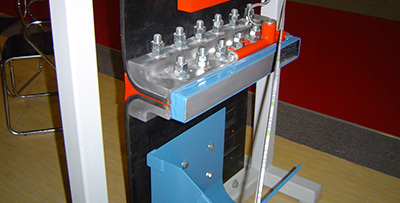News Center
Hezi technology focuses on the research and development of "rapid seamless conveyor belt joint sleeve" innovative technology project

NEWS CENTER

News Details
Exploring the Advantages of Steel Core Conveyor Belts in Chemical Applications
Release time:
2025-06-01
Steel core conveyor belts represent a robust solution for industries requiring reliable material handling systems. As a critical component in chemical processing, these belts are engineered to withstand extreme conditions while ensuring efficiency and safety. Understanding the unique properties and advantages of steel core conveyor belts can significantly enhance operational performance in chemical applications.
Steel core conveyor belts represent a robust solution for industries requiring reliable material handling systems. As a critical component in chemical processing, these belts are engineered to withstand extreme conditions while ensuring efficiency and safety. Understanding the unique properties and advantages of steel core conveyor belts can significantly enhance operational performance in chemical applications.
When it comes to transporting various materials in the chemical industry, the choice of conveyor belt can directly impact productivity and safety. Steel core conveyor belts stand out due to several inherent properties that make them particularly effective in this field.
Steel core conveyor belts are meticulously crafted to offer exceptional durability. The steel reinforcement provides structural integrity, allowing the belts to handle heavy loads without risk of breakage. This feature is crucial in chemical applications where the transportation of heavy materials is a common requirement. Unlike standard rubber belts, steel core belts maintain their shape and strength under extreme conditions, leading to reduced downtime and increased productivity.
One of the primary challenges in the chemical industry is dealing with corrosive substances that can degrade conveyor materials. Steel core conveyor belts exhibit remarkable resistance to many chemicals, ensuring longevity and reliability. This resistance minimizes the risk of wear and tear, thereby reducing maintenance costs and enhancing safety standards within the workplace.
The inherent strength of steel core conveyor belts provides superior load-bearing capacity compared to alternative options. This characteristic allows for the efficient transportation of large quantities of chemicals and hazardous materials without compromising safety. The enhanced load capacity is particularly beneficial in bulk material handling scenarios, where the transport of heavy loads is a daily requirement.
Rubber conveyor belts have long been used in various industries, but when it comes to the chemical sector, they often fall short. Rubber is prone to degradation and chemical attack, which can lead to vulnerabilities in high-stress environments. In contrast, steel core belts provide a much higher resilience, ensuring consistent performance under challenging conditions.
Polyvinyl chloride (PVC) conveyor belts are often praised for their flexibility and lightweight nature. However, they do not offer the same level of strength and chemical resistance as steel core belts. The latter provides a more durable solution for heavy-duty applications, making them the preferred choice in environments where chemical handling is critical.
Steel core conveyor belts are essential for safely transporting hazardous materials. Their robust design minimizes the risk of spills or breakages, which is crucial for maintaining safety standards. The ability to withstand harsh chemicals ensures that operations run smoothly without compromising worker safety or environmental regulations.
In chemical production facilities, bulk materials must be transported efficiently. Steel core belts excel in this area, offering reliable performance for transporting powders, granules, and liquids. Their durability ensures that they can handle constant wear and tear, resulting in lower replacement costs and increased operational efficiency.
Routine inspections can help identify wear and tear before they lead to significant issues. Keeping the belts clean is equally important, as contaminants can cause premature damage. A well-maintained steel core conveyor belt can significantly enhance operational efficiency and reduce the likelihood of downtimes.
Common issues with steel core conveyor belts include misalignment and spillage. Addressing these issues promptly ensures that operations remain efficient. Implementing a troubleshooting guide can assist operators in quickly identifying and resolving problems, minimizing disruption to the workflow.
While the initial investment in steel core conveyor belts may be higher than alternatives, their long-term cost-effectiveness is undeniable. The durability and reduced maintenance needs lead to lower overall ownership costs. Furthermore, the enhanced efficiency and productivity they provide can result in significant savings over time.
In conclusion, steel core conveyor belts offer unparalleled advantages for chemical applications, combining strength, durability, and resistance to harsh conditions. Their ability to handle heavy loads and corrosive substances makes them the optimal choice for various operations in the chemical industry. By investing in steel core conveyor belts, companies can ensure safety, efficiency, and long-term cost savings. Understanding the maintenance and applications of these belts further solidifies their position as an essential component in chemical processing, enabling businesses to thrive in a demanding environment.

Recommend News





























